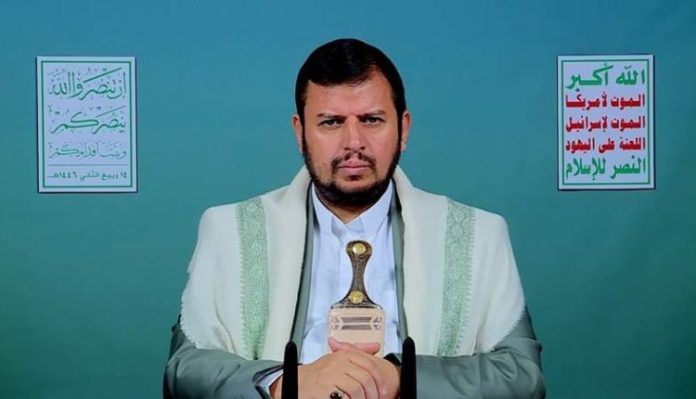The leader of Yemeni revolution Sayyed Abdul-Malik al-Houthi underlined on Thursday Syria’s critical role in resisting Israeli ambitions after the collapse of the Assad regime following the insurgency that took over the country.
In his speech on the latest developments, Sayyed al-Houthi called for solidarity with Syria and its people, condemning ongoing Israeli aggression and its exploitation of the conflict to bolster its influence in the region.
He pointed to recent statements by Israeli officials, particularly Prime Minister Benjamin Netanyahu, who described the potential fall of the Syrian government as an opportunity for the occupation to redraw strategic boundaries.
Sayyed al-Houthi warned that the Israeli occupation was working to dismantle agreements such as the disengagement accords and capitalize on the situation to expand its control.
“The Israeli enemy views developments in Syria as a real chance to impose new realities, not only within Syria but also throughout the region,” he said, adding that the Zionist project seeks to destabilize the Middle East by fragmenting nations into smaller, more vulnerable entities.
Unwavering support for Syria
The Yemeni leader expressed his country’s unwavering support for Syria against what he termed the “Israeli-Zionist aggression,” emphasizing the interconnectedness of Resistance movements across the Arab and Islamic world.
He also linked the occupation’s actions in Syria to its broader strategy, describing it as part of a “new Middle East” plan designed to weaken nations and empower Israeli dominance.
As part of this two-phased plan, Sayyed al-Houthi explained, sectarian divisions were exploited to further US-Israeli interests, a tactic he denounced as detrimental to regional unity, urging solidarity among nations and calling for action to counter these schemes.
The first phase, according to Sayyed al-Houthi, involves normalizing relations with the Israeli occupation and eliminating obstacles to resolving the Palestinian issue in the Israeli regime’s favor. The second phase seeks to divide major nations into smaller states, thereby increasing Israeli influence.
He warned that such a plan would expand the occupation’s territorial control to include regions of the Levant, Egypt, Iraq, and Saudi Arabia, reducing Arab nations into fragmented entities.
Yemen’s support for Palestinian cause
The leader’s speech also touched on Yemen’s active involvement in supporting the Palestinian cause, including joint operations between Yemeni and Iraqi Resistance forces targeting Israeli interests. He called for mass demonstrations in Yemen to express solidarity with Palestine, Syria, and Lebanon, urging continued resistance to Israeli and US aggression.
Sayyed Al-Houthi emphasized the extensive training provided to hundreds of thousands of Yemenis to enhance their combat skills and psychological readiness, declaring their preparedness to fight those who threaten Yemen’s sovereignty.
“We have trained our people to acquire combat skills and stand prepared psychologically, culturally, and spiritually for the battle,” he stated, affirming that their stance is “rooted in faith and trust in God.”
Sayyed Abdul-Malik stressed the need for everyone to participate in these events, reaffirming Yemen’s continued efforts and jihad in support of the Palestinian people and in solidarity with any Arab nation facing Israeli aggression.
Sayyed al-Houthi condemned Israeli attacks in Gaza, specifically the deliberate bombing of the oxygen plant at the Kamal Adwan Hospital, which he described as a crime against children and patients in intensive care.
He also denounced the Israeli occupation’s ongoing crimes, including house demolitions, land seizures, and the establishment of new settlements in the West Bank.


















